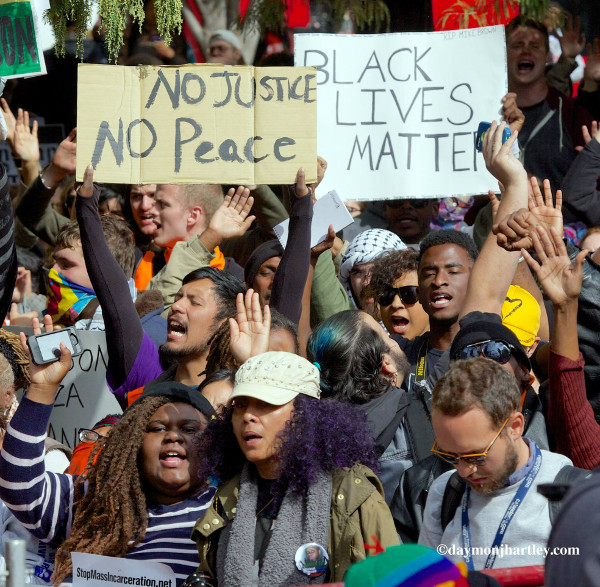
PHOTO/DAYMONJHARTLEY.COM
Laura Garcia of the Tribuno del Pueblo interviewed Mari Caldwell-Robinson at the Michael Brown protests in Ferguson, MO. Mari is part of North Carolina’s Black Workers for Justice and their youth organization, Hip Hop for Justice in Raleigh.
Laura Garcia: Why are you in Ferguson?
Mari Caldwell-Robinson: I was angry and had to come. I feel connected to the people in St. Louis because it happens everywhere. We have issues with police brutality. We have organizations fighting with the Durham police to get more respect in their communities. I came so we could get different points of views and bring strategies back so that we can all network and communicate. If there is something going on in Texas, we’ll go to Texas. If it is happening in Florida, we’ll go to Florida, so we can all be there for each other.
LG: Police have been killing people forever. What is different today?
MC: That we decided as a group, nationally, that we can’t stand for this anymore and are ready to organize. We have been standing for it for hundreds of years, but now we are like, No! We won’t any longer just organize in small groups. Now we’re going across state lines and saying, ‘hey, can you come down and help us organize, or if you can’t come, tweet support or fundraise or write an article for us to help us in our fight.’
LG: Is this movement about more than police brutality?
MC: Yes. There is a system—there’s poverty, unemployment, incarceration, they’re not educating our kids. They are outsourcing jobs. You can’t make it on $7 an hour. So yes, it’s a bigger thing. It’s not just police brutality. There’s a system around it, and there’s people in Congress who are supposed to represent us, but really it’s the Democrats and Republicans fighting each other. but not really representing us.
LG: What role are women playing?
MC: Woman run the movement. We are stepping up and our voices are being heard. We are producing the kids that are possibly going to get shot or that can be leaders in this community. We want a better world for our children and for ourselves. We want respect, just as men are treated with respect. We want our voices heard.
LG: How do you see the youth?
MC: This is a youth movement. Leaders from the 60s say we’ve been content with how things are. It’s not really true. I’ve known people my age who have been fighting since they were 8 or 9, but in states or counties. We have always been fighting, we just haven’t made a lot of noise and we haven’t crossed state lines to help with each other. Social media helps out a lot. Now we can connect nationally or globally.
LG: What do you say to other youth in the country?
MC: Listen. Educate yourself about what’s going on. Sometimes you may not want to be a social activist, you may not want to get in a protest, but at least be knowledgeable about what is going on in your community or county. Vote.
“It’s not just police brutality. There’s a system around it,” says young activist
Latest
The People’s Tribune opens its pages to voices of the movement for change. Our articles are written by individuals or organizations, along with our own reporting. Bylined articles reflect the views of the authors. Articles entitled “From the Editors” reflect the views of the editorial board. Please credit the source when sharing: peoplestribune.org. Please donate to help us keep bringing you voices of the movement for change. Click here. We’re all volunteer, no paid staff. The People’s Tribune is a 501C4 organization.

